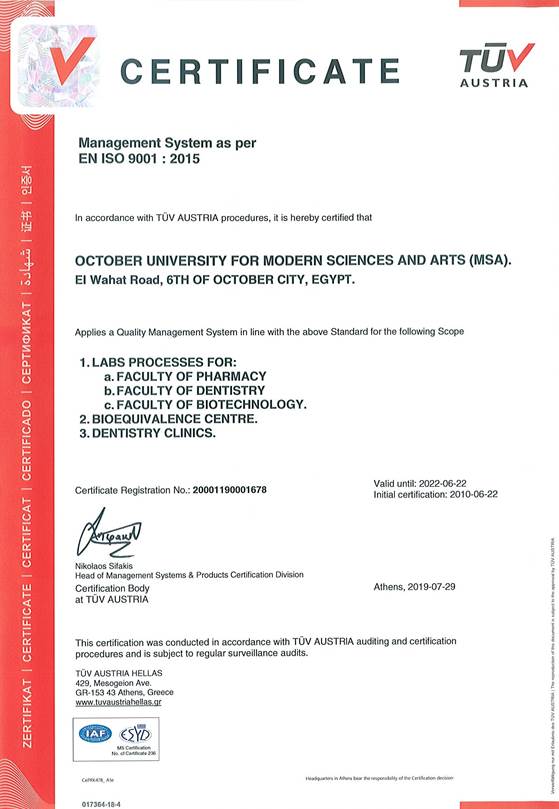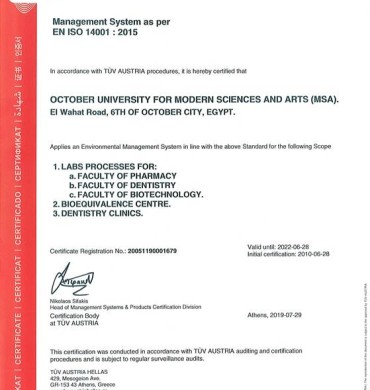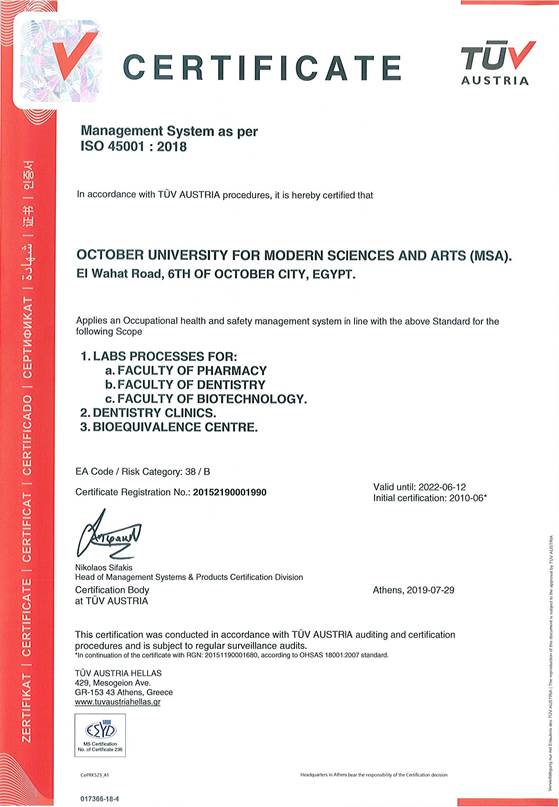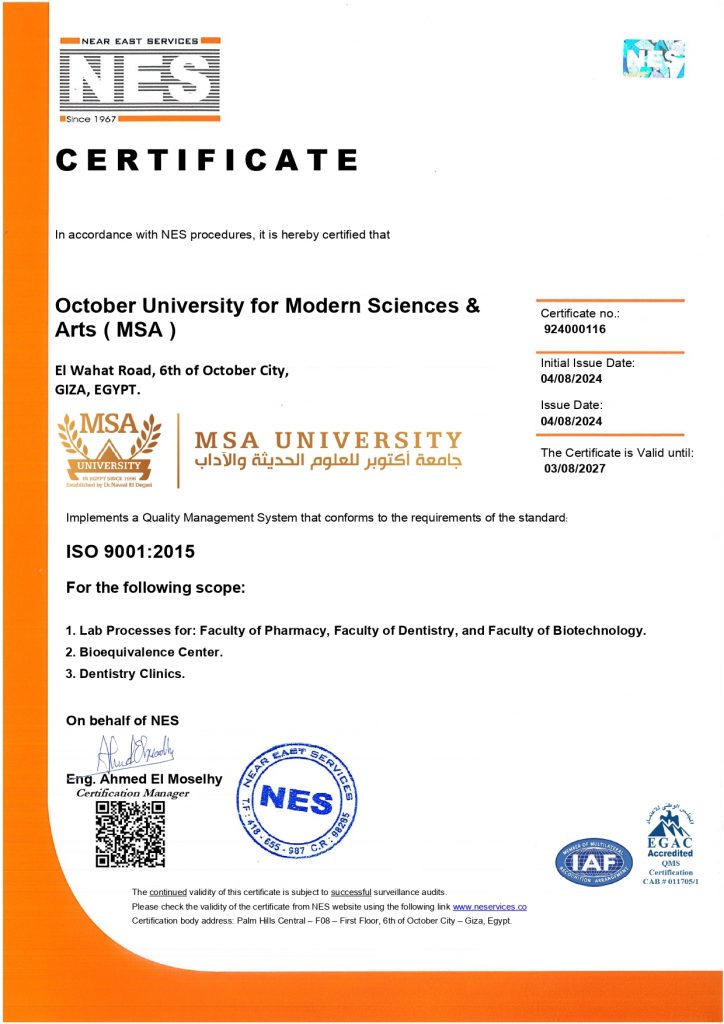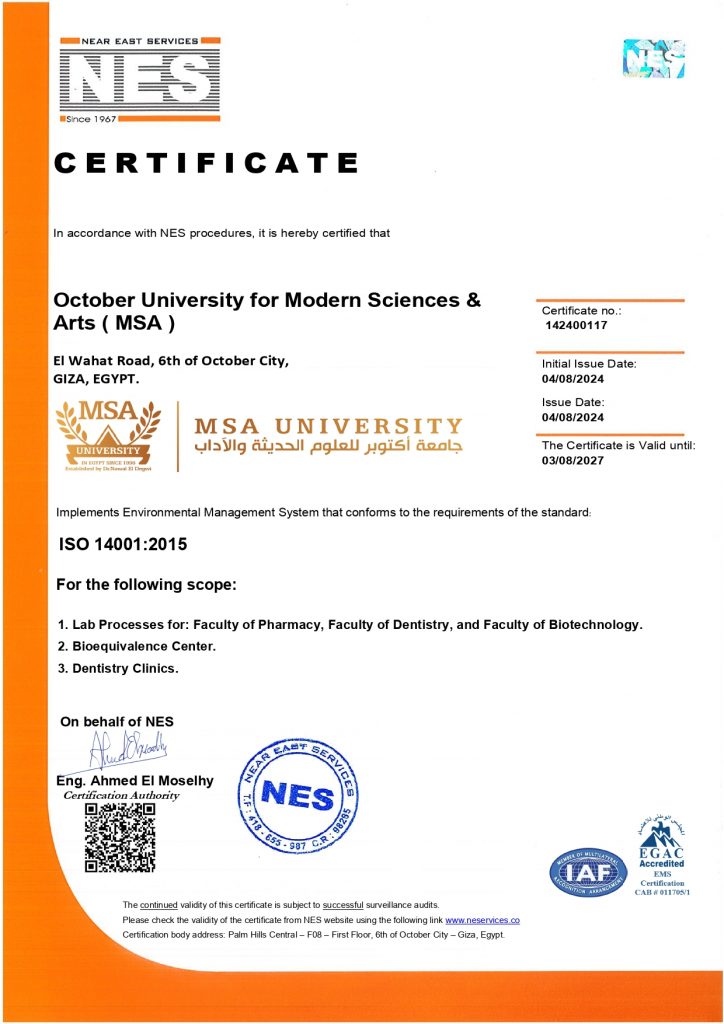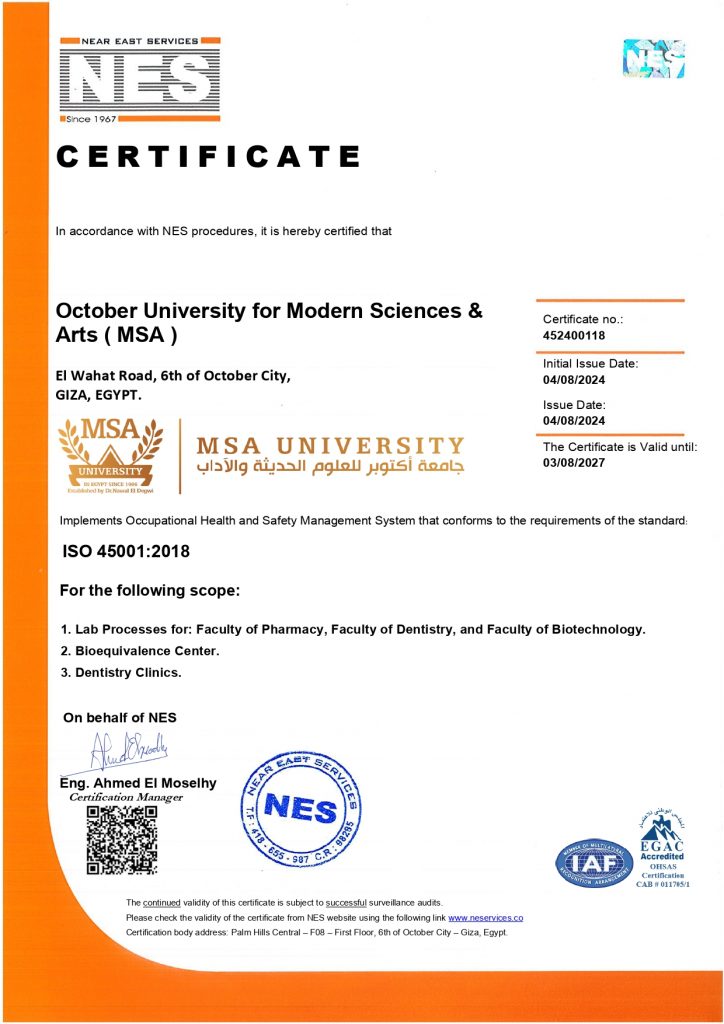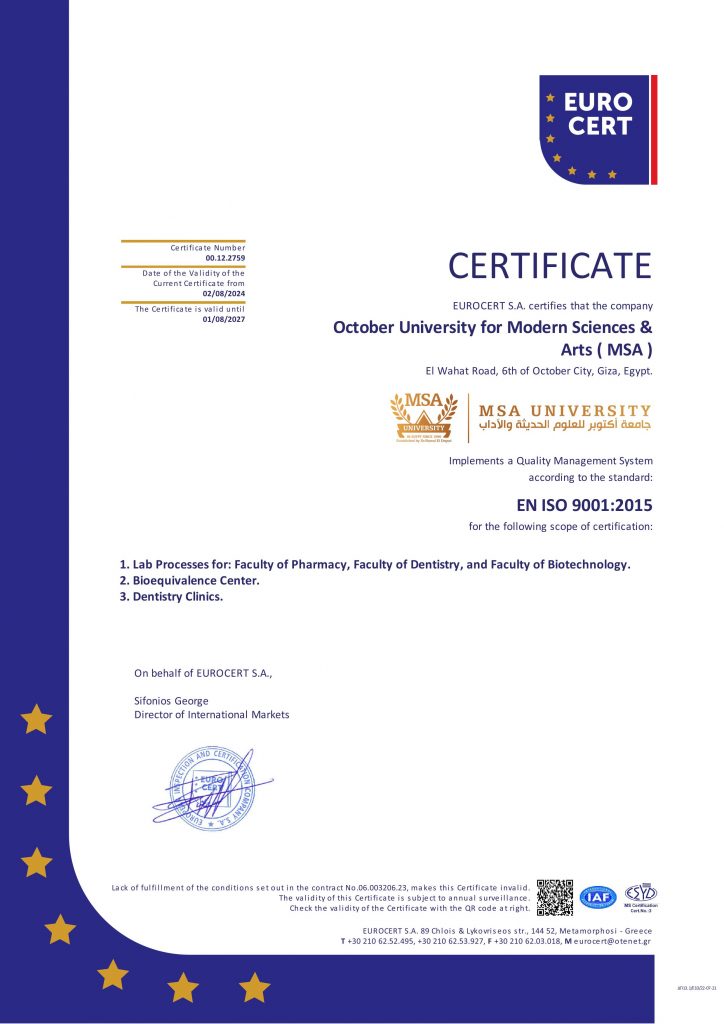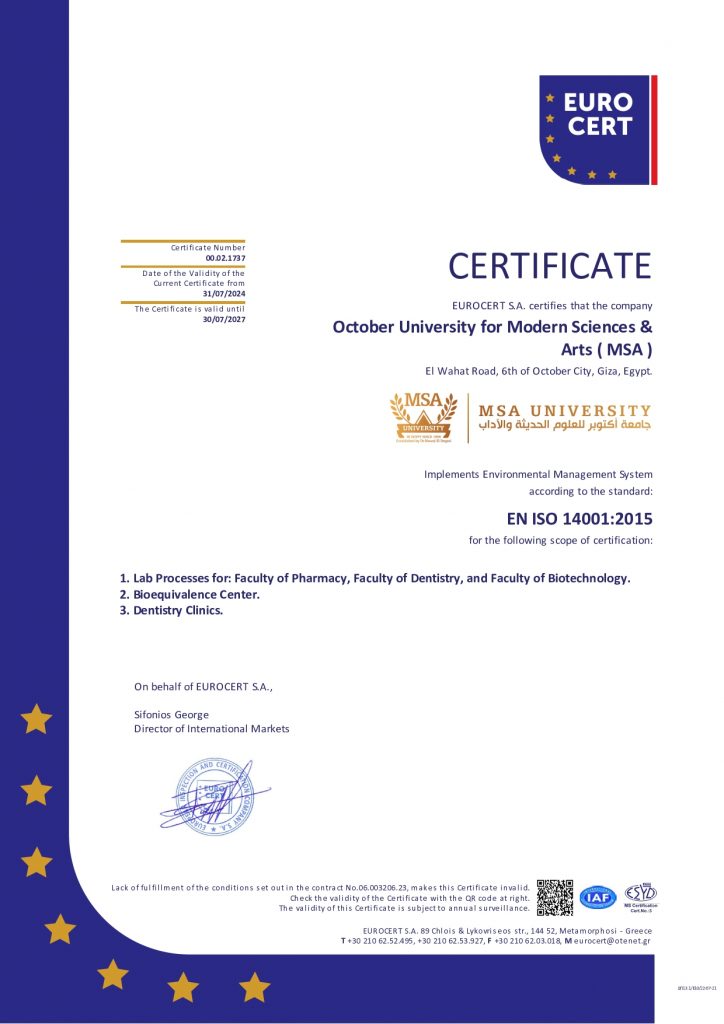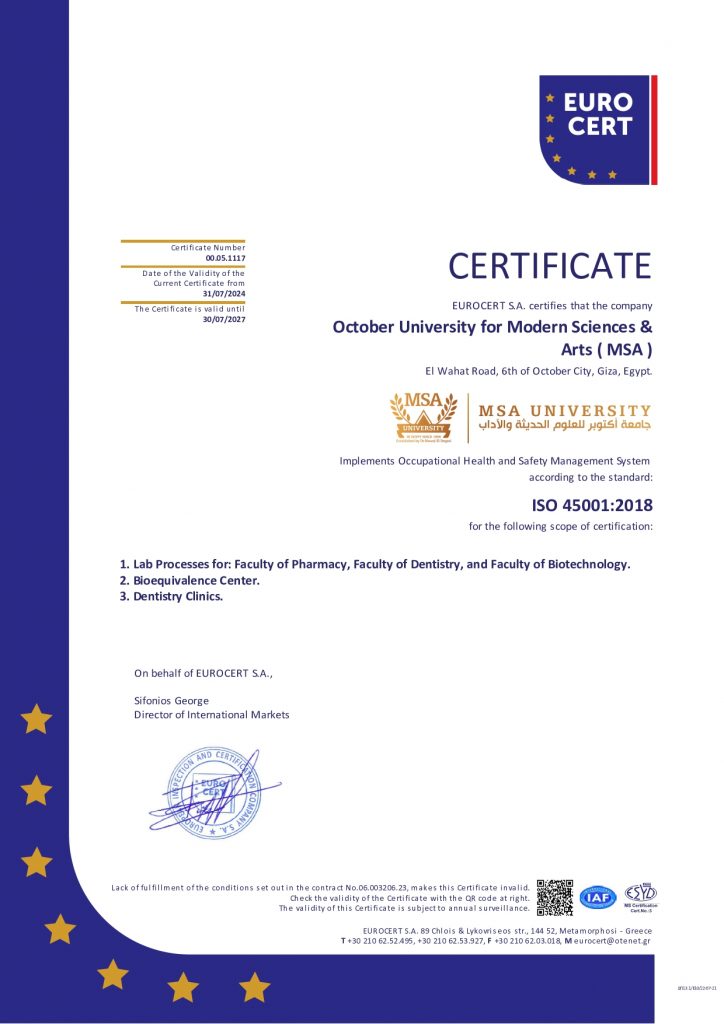ISO CERTIFICATIONS
October University for Modern Sciences and Arts – MSA University, has been certified in accordance with TÜV AUSTRIA Procedures, as meeting the standard requirements of:
- ISO 9001 : 2015 – Quality Management Systems.
- ISO 14001 : 2015 – Environmental Management Systems.
- ISO 45001 : 2018 – Occupational Health and Safety.
MSA University applies all the three earned certificates in line with the above-mentioned Standard for the following Scope:
- Labs processes for: (Faculty of Pharmacy - Faculty of Dentistry - Faculty of Biotechnology)
- Bioequivalence Centre.
- Dentistry Clinics.
MSA University - ISO Certifications from TÜV AUSTRIA
MSA University - ISO Certifications from NES
MSA University - ISO Certifications from Euro cert
Who is TÜV AUSTRIA ?
TÜV AUSTRIA Group is internationally acknowledged with a comprehensive experience in safety, quality and environmental protection; we offer technical inspections and certification audits. With an experience of over 145 years and an expert team of high qualification, as well as laboratories and last generation equipment.
TÜV AUSTRIA is a competent partner to all industries and we offer a wide range of comprehensive services such as: Third Party Services, Technical Inspection Services, Industrial Inspection Services, Renewable Energy Services, Hazard Assessment and operation difficulties services, Initial and periodic inspection of all kind of lifting appliances, Product Certification, CE and QMS services and specialized Industrial Training services’.
TÜV AUSTRIA has been established in Vienna in 1872 and is one of the most historical, bigger and prestigious Inspection, Testing and Certification Bodies activated worldwide. TÜV AUSTRIA is activated in more than 32 countries in Europe, Africa, Middle & Far East and Latin America through a wide network of subsidiaries, affiliated companies and cooperation partners as well.
ISO 9001
ISO 9001 specifies the general requirements for development, implement and improvement of a organization’s operation, with the aim of satisfying customer requirements. It can be applied by any organization to improve its performance, regardless of size or the field of activity.
The management quality standard is the most widely used standard in the world.
The standard’s fundamental principles are
- Customer focus
- Leadership
- People engagement
- A process approach
- Improvement
- Evidence-based decision making
- Relationship management with interested parties
Benefits of (ISO 14001:2004)
- Enhancing customer confidence that the product and/or service provided satisfies the mutually agreed requirements as well as the applicable laws and regulations.
- Reducing operating costs through efficient operation and increased productivity.
- Increasing satisfaction of current and future needs of both customers and interested parties (employees, stakeholders and social environment).
- The implementation of continual improvement, with the aim of continually improving the organization’s activities.
- Creating a competitive advantage and attracting new customers and investors in international markets.
- Improving the performance of the organization’s corporate results, in combination with the required resources, to maintain its competitiveness in the global economic environment.
ISO 14001
ISO 14001 specifies the general requirements for an Environmental Management System in an organization. ISO 14001 focuses on recognition of the environmental impacts of the organization’s operations, in order to minimize them and enhance its environmental performance. ISO 14001 Environmental Management System can be applied to all categories of organizations, regardless their sector or the product or service they provide.
ISO 14001 is the most is the most widely used Environmental standard in the world.
The standard’s fundamental principles are
- Customer Focus
- Engagement of top management
- Active participation of personnel
- Commitment to continuous improvement and compliance with the applicable regulations and legislation
- Management of relationships with interested parties
Benefits of (ISO 14001)
- Protecting the environment,
- Continual improvement,
- Compliance with legal requirements and avoidance of fines,
- Conserving natural resources and reducing costs,
- Improving an organization’s public image,
- Improving communication with public authorities.
ISO 45001
ISO 45001 standard specifies the requirements for the implementation of an Occupational Health and Safety Management System. It focuses on effective control of all occupational risks for all interested parties (employees, visitors, suppliers, local community etc), and on achieving improvements in overall Health and Safety performance in the workplace. ISO 45001 is designed to cover occupational health and safety, and not the safety of products or processes.
The standard’s fundamental principles are
- Customer focus
- Engagement of top management
- Active participation of personnel
- Commitment to continuous improvement and compliance with the applicable regulations and legislation
- Management of relationships with interested parties
Benefits of (ISO 45001)
- Recognition, assessment and management of all potential risks through the implementation of programs for reducing risk (to acceptable levels) and minimizing risks in the workplace.
- Reduction of the number of accidents that happen at a company
- Continual improvement of performance on issues of occupational health and safety
- Systematic monitoring and implementation of the legislation on occupational health and safety
- Reduced costs from accidents (e.g. compensation, hospital care).

